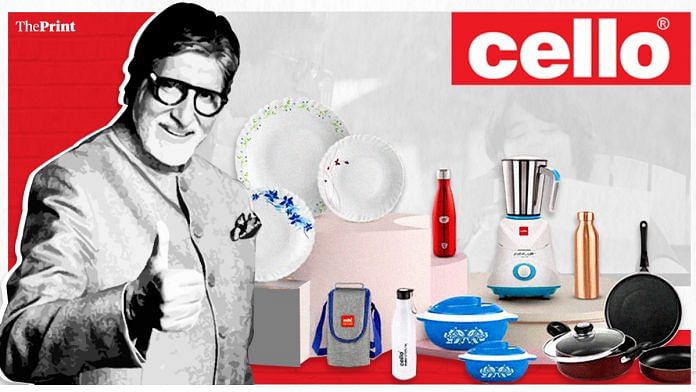New Delhi: Depending on who one talks to, the brand Cello invokes different memories. For 1990s school children, it was all about stationery while for some others the brand stands for affordable houseware.
Cello has overtime become one of the most recognised brands in India given its wide range of products from plastics, steelware to stationery and cleaning products.
But it did not begin that way. The launch of the company can be traced back to 1967, when Ghisulal Rathod, late founder and chairman of the Cello Group, started a small plastic industry with seven machines and 60 workers to manufacture plastic bangles and Polyvinyl chloride (PVC) footwear in Mumbai’s Goregaon.
Then it began to diversify: The Cello Group officially made its entry into the market in 1982, when it first launched plastic houseware products and set up a factory for thermo-ware products in 1986.
The company embarked on manufacturing plastic-moulded furniture in 1994 with state-of-the-art moulds from Italy.
Nearly three decades later, in 2017, Gaurav Rathod, the third heir in the Rathod’s family, launched the ‘Opalware’ segment and transformed it into a business worth Rs 200 crore within just three years. Opal ware refers to wares made of opal glass that are specifically heat-resistant.
Earlier this year, Cello also introduced its latest product series ‘Tri-ply cookware’, which includes frypan, kadai, grill pan and casseroles in varied sizes.
“I recently bought a water bottle for my daughter for Rs 1,000. I wouldn’t have paid that much if it was not from the company Cello,” said Ankit Gupta, a cybercafe owner in Laxmi Nagar in New Delhi. He added that the brand stands apart from others in terms of quality.
According to Harish Bijoor, a brand strategy expert, Cello’s rise in the market is because the brand made it fashionable to own a houseware conglomerate. “Cello was the earliest brand effort in a space that was dominated by commodity offerings. The brand made it a fashion to own one.”
Gaurav Rathod, director of the Cello Group, says the idea has been to make Cello the “go-to brand for everyone”.
“With an unbeatable combination of style, durability, and classical designs, the company has endeared itself to its customers and has become the go-to brand for everyone,” Rathod told ThePrint.
Also read: ‘Asli swaad zindagi ka’ — this 90s Cadbury Dairy Milk commercial changed Indian advertising
Cornering the pen market
For many in India, Cello is the brand of pens they used during their school days and not so much the cookware or plastic furniture. Back in 1995, the company was India’s largest manufacturer of pens, holding a 37 per cent market share and producing over five million units daily.
“During my school days, I used to just buy new refills instead of pens. Cello’s Butterflow pens’ comfort really stood out from the rest,” said 23-year-old Norbu, a first-year student at Delhi University.
Cello prioritised using the latest technology and came up with ideas of Swiss tips, German ink in its clear pens and even developed LPHV (Low-Pressure High Volume) technology in-house.
The company branded its pens as comfortable, something that would ease the pressure on students while writing exams. A 2014 ad for its Smooth Glide gel pen with the tagline “the smoothest writing pen” further drove home the point.
In 2015, the company sold its stationery business to France’s stationery maker BIC Clichy for Rs 540 crore.
Also read: Kids of ’90s will remember these ‘cigarettes’ fondly, despite its controversial, unhealthy tag
A diversified portfolio
In 2018, business magazine Insights Success shortlisted the Cello Wim Plast Limited among the “10 Most Admired Plastic Companies”.
At the core of Cello’s massive growth and success lies its ability to produce a wide variety of high-quality houseware products in an unorganised Indian market and its investment in the latest worldwide technology, the report stated.
While the company has kept expanding its offerings over the years, the top four segments that make over 60 per cent of its gross sales are insulated and non-insulated plasticware, vacuum-insulated steel-ware, moulded furniture and glassware.
Roping in Bollywood actor Amitabh Bachchan as its brand ambassador in October last year was the cherry on the top. The company clocked a turnover of Rs 1,500 crore in the 2019-2020 fiscal year and has exports worth more than $39 million.
While the company has managed to set itself apart from other players with consumers’ trust in its quality and durability, it continues to face stiff competition from companies such as Tupperware, Lock & Lock, Pearl Pet, and some unbranded players like Lock & Seal, Modern Lock and Nayasa.
“We will continue to consolidate our leadership position across all our key growing categories and explore categories that have volume and value growth potential in sync with our brand,” Rathod told ThePrint.
(Edited by Rachel John)
Also read: Convalescent, healthier than milk — Complan’s turbulent journey with its ‘tall claims’



